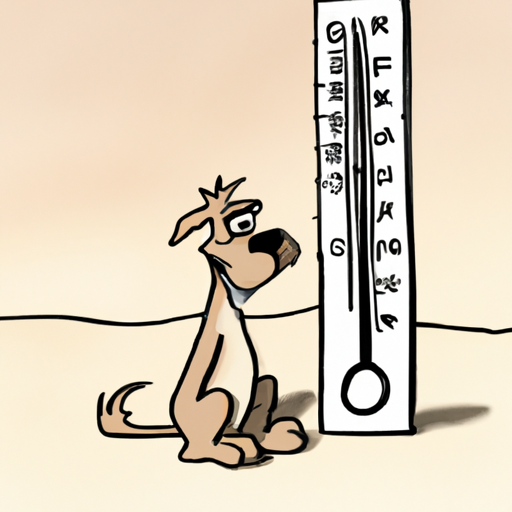Understanding Your Dog’s Temperature Needs
As a caregiver to your beloved pet, it’s crucial to understand that dogs, just like humans, experience discomfort in extreme temperatures. Dogs are more susceptible to heat than we are. Their bodies are designed to conserve heat, and while this is beneficial in cold weather, it can be detrimental in the heat. Your pooch might not show it, but anything above 20°C (68°F) can start to get uncomfortable.
Recognizing Heat Stress in Dogs
As a caregiver, you have the responsibility to recognize the signs of heat stress in your dog. Here are some indicators:
- Excessive panting or difficulty breathing
- Increased heart and respiratory rate
- Drooling, mild weakness, stupor, or even collapse
Also, keep an eye out for symptoms such as seizures, bloody diarrhea, and vomit along with an elevated body temperature of over 104°F.
How to Keep Your Dog Cool
During the hot summer months, it’s essential to ensure your dog stays cool and comfortable. Here are some tips:
- Provide Plenty of Water: Dogs need to hydrate more in hot weather. Always ensure your dog has access to fresh drinking water.
- Keep them Indoors: If possible, keep your dog indoors in an air-conditioned environment during the peak heat of the day.
- Use Cooling Mats: Cooling mats can be a great way to help your dog chill out.
- Limit Exercise: Try to walk your dog early in the morning or late in the evening when it’s cooler.
How Hot is Too Hot?
| Outside Temperature (°F) | Risk Level for Dogs |
|---|---|
| 70-79 | Low – but keep an eye on your dog |
| 80-89 | Potential risk – provide plenty of water |
| 90-99 | High risk – keep your dog indoors |
| 100+ | Extreme risk – do not expose your dog to this heat |
Remember, these are just guidelines. Individual dogs may react to heat differently.
Protecting Dogs in the Heat
As a caregiver, your dog’s health and well-being should always be your top priority. The best way to protect your dog in the heat is to be prepared. Always have water on hand, try to avoid the hottest parts of the day, and never, ever leave your dog in a hot car.
FAQ
Q: What do I do if my dog is overheating?
A: Move them to a cooler area, provide fresh water, and call a vet immediately.
Q: Can I shave my dog to keep them cool?
A: Not necessarily. Dogs’ coats are designed to protect them from heat and cold. Consult a vet before making drastic changes.
Q: How can I tell if my dog is dehydrated?
A: Symptoms of dehydration may include dry nose, visible tiredness, excessive panting, and sunken eyes. If you suspect dehydration, contact a vet.
Q: Are some breeds more susceptible to heat than others?
A: Yes, breeds with thick coats and short noses, like bulldogs and pugs, are more susceptible to heat.
Remember, as a caregiver, it’s your duty to ensure your dog’s comfort and safety in all weather conditions. Always stay informed and attentive to your dog’s needs.



